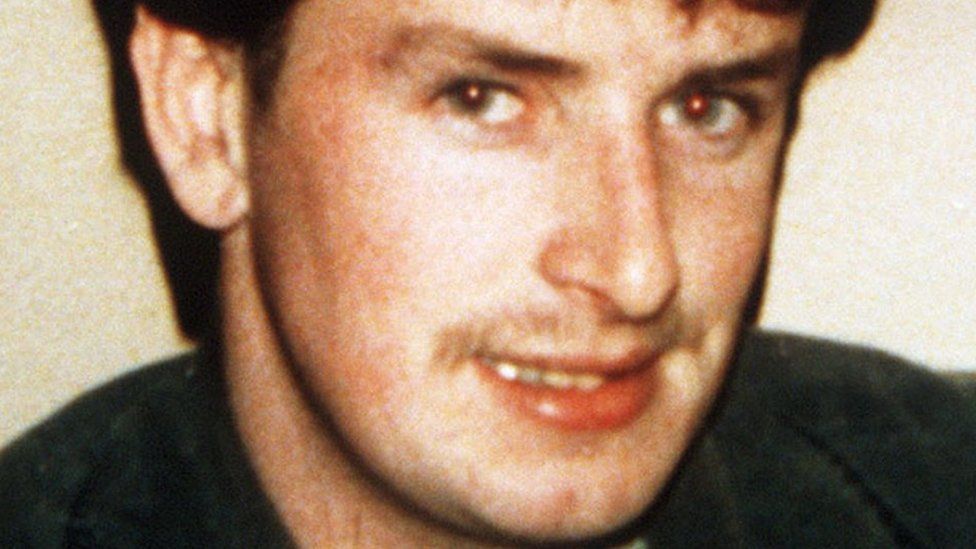Aidan McAnespie: Ex-soldier found guilty of checkpoint shooting
- Published

Former soldier David Holden has been found guilty of the manslaughter of Aidan McAnespie in Tyrone 34 years ago.
The 53-year-old is the first veteran to be convicted of a historical offence in Northern Ireland since the 1998 Good Friday Agreement.
Mr McAnespie was killed by a shot which ricocheted off the road and struck him in the back.
His family said they were "relieved and happy" with Friday's verdict after a 34-year wait.
Aiden McAnespie was walking through a border crossing on his way to a Gaelic football match when he was shot.
Mr Justice O'Hara said he considered the defendant "criminally culpable" beyond any reasonable doubt.
He found that Holden had pointed a machine gun at Mr McAnespie and pulled the trigger, while assuming the gun was not cocked.
He said: "That assumption should not have been made."
In his written judgement, Mr Justice O'Hara said he was satisfied the defendant had not cocked the weapon himself before firing it.
He said he fundamentally disagreed with the suggestion that it was not exceptionally bad for the defendant to have assumed that the weapon was not cocked.
"In my judgement this was the ultimate 'take no chances' situation because the risk of disaster was so great.
"The defendant should have appreciated at the moment he pulled the trigger that if the gun was cocked deadly consequences might follow."
The judge told the court Holden had given a "deliberately false account" of what happened.
He dismissed the defendant's claim that his hands had been wet from cleaning duties.
He also concluded Holden's explanation as to how the weapon came to be fired was "entirely unconvincing" and was a "deliberately false account of what happened".
In the written judgement, he said the defendant had broken two "golden rules", which included never aiming a weapon unless one intends to fire and never increasing the risk of negligent discharge.
The court heard Mr McAnespie was unarmed.
First Army veteran conviction
David Holden is the first - and could be the last - Army veteran convicted post-Belfast Agreement for a Troubles-era crime.
The government legacy bill, if passed next year, could end future prosecutions under a conditional amnesty scheme.
Currently, Soldier F, accused of murders on Bloody Sunday, is the only other veteran where trial proceedings are progressing.
Around a dozen other veterans are awaiting prosecution decisions from the Public Prosecution Service.
It is possible that they will face no action if, should they be charged, proceedings are not started by next May, or if the bill passes before then.
In 2019, the government made a manifesto commitment to protect veterans from historical investigations and prosecutions.
The bill not only covers veterans, but anyone involved in killings from the troubles, including paramilitaries.
A further hearing to determine the sentence will be held in the new year.
Speaking after the ruling, Mr McAnespie's brother Sean said the family never believed they would get the judgement after 34 years.
"I'm thinking of my father and mother who prayed and prayed for this day and they're not here to see it," he said.
"As a family we are very relieved and happy that we have such a big family, community and relations, to help us through this."
David Holden sat in the dock, wearing a suit and tie, with a guard beside him.
Behind a glass partition, around two dozen of Aidan McAnespie's relatives and their supporters watched from the public gallery.
As the judge criticised Holden's evidence as being "deliberately false", members of the family looked at each other and nodded - knowing that a guilty verdict was looking likely.
Outside the courtroom, a number of them wept and embraced.
David Holden's expression remained neutral throughout the proceedings.
Holden, who was serving in the Grenadier Guards and was aged 18 at the time, was on his first day of checkpoint duties.
Mr McAnespie was known to security forces as a "person of interest" - an IRA suspect.
Holden was initially charged with killing Mr McAnespie in September 1988.
At that time, staff from the Director of Public Prosecutions met with the senior RUC investigating detective and a forensic firearms expert and decided to withdraw the manslaughter charge.
In December 1988, Holden was subsequently charged by the Army under Section 69 of the Army Act 1955 with the offence of "prejudice to good order and military discipline'' and was fined £370.86 by his commanding officer.
During the trial, defence counsel Frank O'Donoghue KC told Mr Justice O'Hara: "My client, by the age of 19, believed that this matter was behind him and he could pursue his own life and left military life in 1990.''
The court heard that in 2008, the PSNI's Historical Enquiries Team (HET), reviewed the case of Mr McAnespie and produced a report for his family.
Seven years later, the Attorney General for Northern Ireland invited the director of the Public Prosecution Service (PPS) to review the case in light of the HET report.
In January 2018, the PPS informed Holden that a decision had been taken to prosecute him for Mr McAnespie's manslaughter.
Paul Young, from the Northern Ireland Veterans Movement, said the people he represents would be "deeply disappointed" with the verdict.
"I'm saddened by it but it's not over for David yet," he said.
"As far as I'm aware, his team are going to appeal the decision and I think eventually, if necessary, go to the Supreme Court."
In a statement after the verdict, the Northern Ireland Office said its condolences were with the family of Aidan McAnespie.
It added that the government's legacy bill, which is progressing through parliament, "seeks to address the legacy of Northern Ireland's past by implementing an effective information recovery process that will provide answers for families and help society to look forward".
Related Topics
- Published1 July 2022
- Published30 May 2022